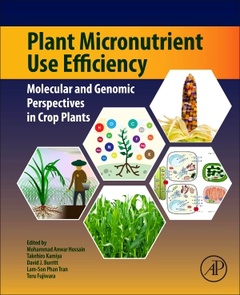Description
Plant Micronutrient Use Efficiency
Molecular and Genomic Perspectives in Crop Plants
Coordinators: Hossain Mohammad Anwar, Kamiya Takehiro, Burritt David, Phan Tran Lam-Son, Fujiwara Toru
Language: English
Subjects for Plant Micronutrient Use Efficiency:
324 p. · 19x23.3 cm · Paperback
Description
/li>Contents
/li>Readership
/li>Biography
/li>Comment
/li>
Plant Micronutrient Use Efficiency: Molecular and Genomic Perspectives in Crop Plants presents information on the complex mechanisms regulating micronutrient use efficiency in plants. Understanding this science is essential for the development of new varieties of crop plants that are more resilient to micronutrient stress, as well as plants with increased bioavailable concentrations of essential micronutrients. This book explores the discovery of novel genes and key metabolic pathways associated with micronutrient use efficiency in plants, gives an analyses of the gene expression patterns in plants in response to low and/or high nutrient levels, and investigates the potential functions of these genes and their products.
Strategies to enhance micronutrient use efficiency and stress tolerance, to develop bio-fortified crop, and to improve the sustainable utilization of natural resources are critically evaluated. The book contains both fundamental and advanced information as well as critical commentaries that are useful for those involved in the various fields that make up the plant sciences.
1. Regulation of Micronutrient Homeostasis and Deficiency 2. Molecular Bases of Iron Accumulation Towards the Development of Iron-Enriched Crops 3. Plant Responses to Iron Deficiency and Toxicity and Iron Use Efficiency in Plants 4. Plant Responses to Copper: Molecular and Regulatory Mechanisms of Copper Uptake, Distribution and Accumulation in Plants 5. The Molecular Genetics of Zinc Uptake and Utilization Efficiency in Crop Plants 6. Plant Response to Boron Deficiency and Boron Use Efficiency in Crop Plants 7. Physiological Importance of Manganese, Cobalt and Nickel and the Improvement of Their Uptake and Utilization by Plants 8. Roles of Molybdenum in Plants and Improvement of Its Acquisition and Use Efficiency 9. Proteomics of Micronutrient Deficiency and Toxicity 10. Oxidative Stress in Relation With Micronutrient 11. Strategies for Increasing Micronutrient Availability in Soil for Plant Uptake 12. Micronutrients Use Efficiency of Crop-Plants Under Changing Climate 13. Micronutrient Malnutrition and Biofortification: Recent Advances and Future Perspectives 14. Genomic Approaches for Micronutrients Biofortification of Rice 15. Progress and Prospects for Micronutrient Biofortification in Rice/Wheat 16. Crops With Improved Nutritional Content Though Agricultural Biotechnology
Students, teachers and researchers engaged in plant science studies
Policy makers
Plant-based companies and agribusiness companies
Affiliations and Expertise
Department of Genetics and Plant Breeding, Bangladesh Agricultural University, Mymensingh, Bangladesh
Dr. Takehiro Kamiya is an Associate Professor at the Laboratory of Plant Nutrition and Fertilizers, Department of Applied Biological Chemistry, Graduate School of Agricultural and Life Sciences, at The University of Tokyo, Japan. He obtained his PhD, in 2006, from Nagoya University, Japan. After doing his postdoctoral research at the Nagoya University (2006–07), University of Tokyo (2007–10), Aberdeen University (2010–12), he accepted the position of lecturer at the University of Tokyo. Since 2015, he has been an Associate Professor at the University of Tokyo. His current research interests are
unde
- Presents in-depth information on mineral nutrition, including coverage of all the major micronutrients
- Explores the molecular and genetic aspects of micronutrient use efficiency in crop plants
- Provides information and critical discussion of the latest developments in the micronutrient biofortification of crop plants with an aim to prevent micronutrient deficiencies in humans
- Includes contributions from experts in plant micronutrient use efficiency and crop biofortification




